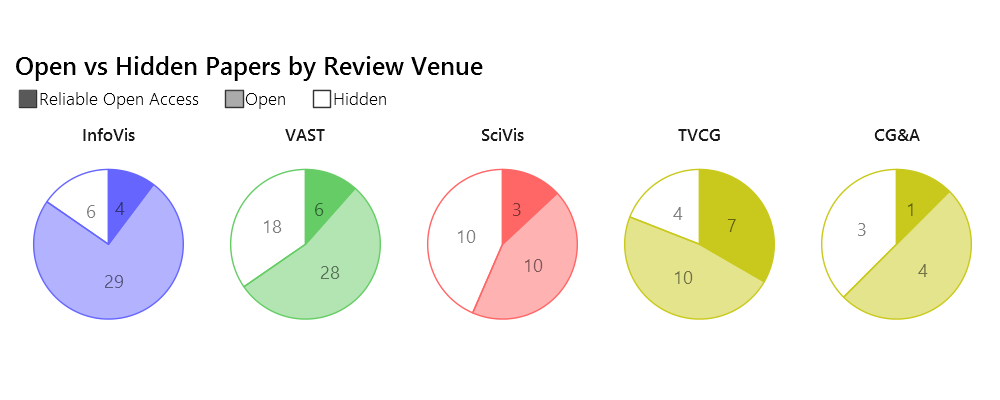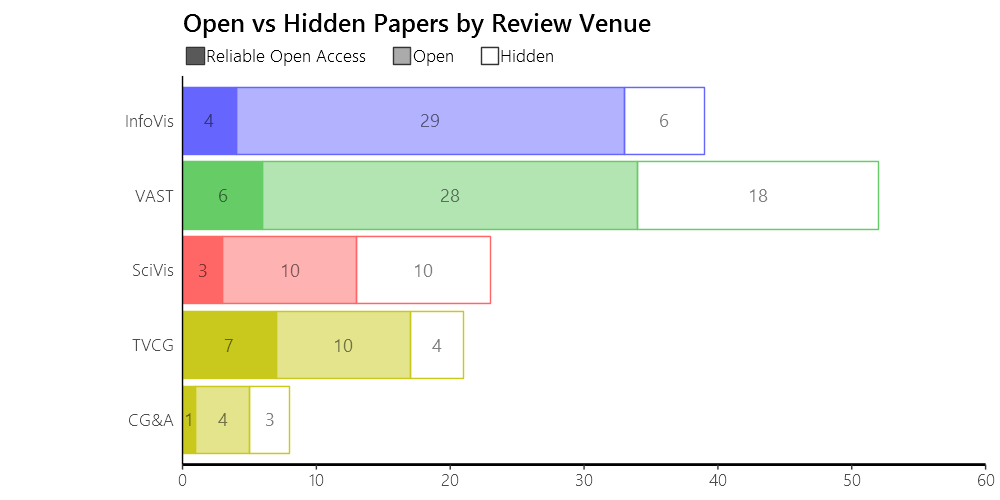The purpose of Open Access Vis is to highlight open access papers, materials, and data and to see how many papers are unavailable outside of a paywall. See the about page for more details about reliable open access.
Why?
Most visualization research papers are funded by the public, reviewed and edited by volunteers, and formatted by the authors. So for IEEE to charge $33 for each person who wants to read the paper is… well… (I’ll let you fill in the blank). This paywall is contrary to the supposedly public good of research and the claim that visualization research helps practitioners (who are not on a university campus).
But there’s an up side. IEEE specifically allows authors to post their version of a paper (not the IEEE version with a header and page numbers) to:
- The author’s website
- The institution’s website (e.g., lab site or university site)
- A pre-print repository (which gives it a static URL and avoids “link rot”)
Badges
Open Access Paper
Open Materials
Open Experiment Data
More detail on the badges is in the about page.
- Only two papers have the full open access materials badge:
Dynamic Influence Networks for Rule-based Models and Clique Community Persistence: A Topological Visual Analysis Approach for Complex Networks - No one has posted their experiment results on an open access repository, so that badge remains unclaimed.
An overview (Updated Oct 24)




How do I get my paper or materials listed here?
- Upload your work to any open access repository (such as the Open Science Foundation). It takes under 5 minutes!
- Make a GitHub issue with the new information.

Hey Steve,
Thanks for pushing for open access, but there’s not reason to do it in one particular way, through OSF or others.
All my papers (almost) are on the institutional web site of France’s public research publication: hal.inria.fr or https://hal.archives-ouvertes.fr/
I mean “all” of them, and this is true for all the Inria researchers since 10 years or so.
It will soon become the rule for EU tax-funded research.
So, please, update your statistics according to the existing institutional repositories.
Also, when is it legitimate to publish an online version of an accepted paper?
Sometimes, when I need to discuss some of my work earlier than the publication date, I put it on arXiv.org and it is a work-in-progress. But otherwise, it seems legitimate to disclose the paper at the conference/journal-publication date or maybe a week before the conference to let attendees read them before the session to have specific questions.
Releasing a paper sooner than that is not part of the “open access” requirements. It is openly accessible when it is published, that’s good enough.
From the perspective of a conference, there is an incentive to disclose new research at the venue, since it attracts people to attend and improves the revenue of the conference.
Removing this incentive is not necessary for open access and not nice for scientific conferences who are usually struggling to balance their budget while offering a good experience to the attendees.
Hi Jean-Daniel,
Thanks for your comment. You are correct that there are more open access repositories than osf. My code checks URLs for several domains including those you mentioned:
osf.io,arxiv.org,biorxiv.org,psyarxiv.org,hal.inria.fr,hal.archives-ouvertes.fr, andeprints.whiterose.ac.uk. I’m happy to add others that might be used for vis. Counting the HAL sites is why Petra is ranked high on the “most in a repository” list.I mention only one repository in the instructions because people tend to indefinitely postpone tasks that begin with a decision (studied in organ donation policy research [Johnson & Goldstein 2003]). I’ll try to clarify that other repositories are counted.
Regarding when an author copy is legitimate to post: The only policy that I know of for IEEE is against publishing in another journal. I don’t know of any legal limit to posting an author copy.
Regarding when an author should post their paper: As soon as the final version is approved by reviewers, it is in the interest of the authors, the funders, and the research community to make the work as broadly available as possible. New projects and in-progress research could benefit by leveraging research as soon as it’s been vetted by reviewers. Even TVCG posts preprints! This year’s VIS papers are already on ieeexplore but only behind a paywall.
Regarding the conference: Conferences are an excellent way to foster collaborations and get a shallow but broad review of up-to-date research. But I don’t believe these events should be prioritized over paper dissemination, even temporarily. If early open access has the potential to reduce revenue, then the conference needs to find a better way to attract people such as presenting more in-progress work (maybe a session of short talks by the best posters?).
Cheers,
Steve
* Johnson, Eric J. and Goldstein, Daniel G., Do Defaults Save Lives? (Nov 21, 2003). Science. 2003. https://ssrn.com/abstract=1324774